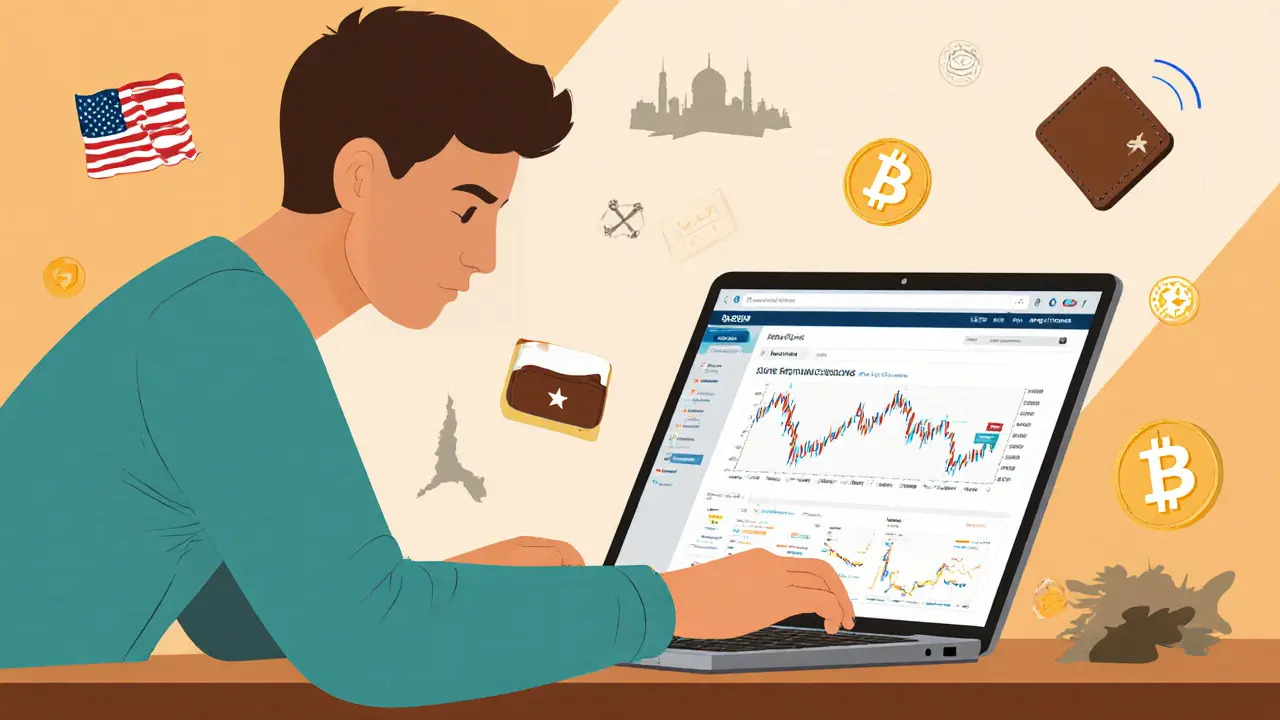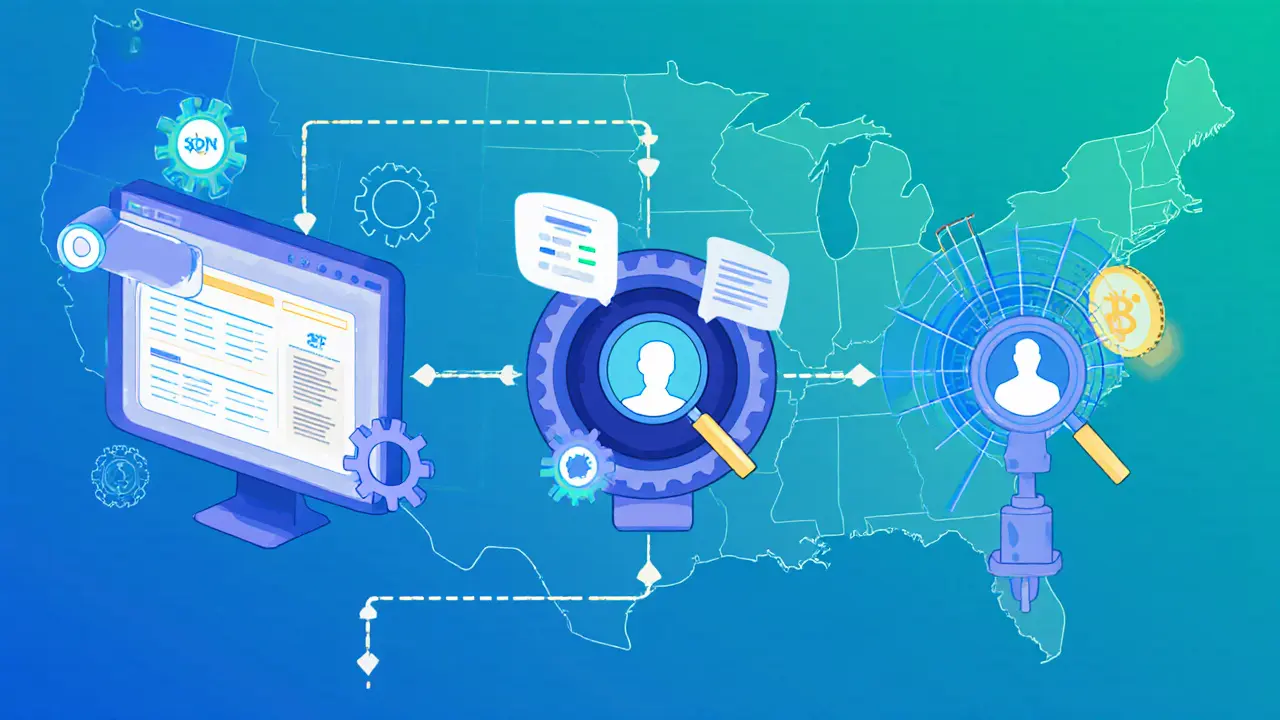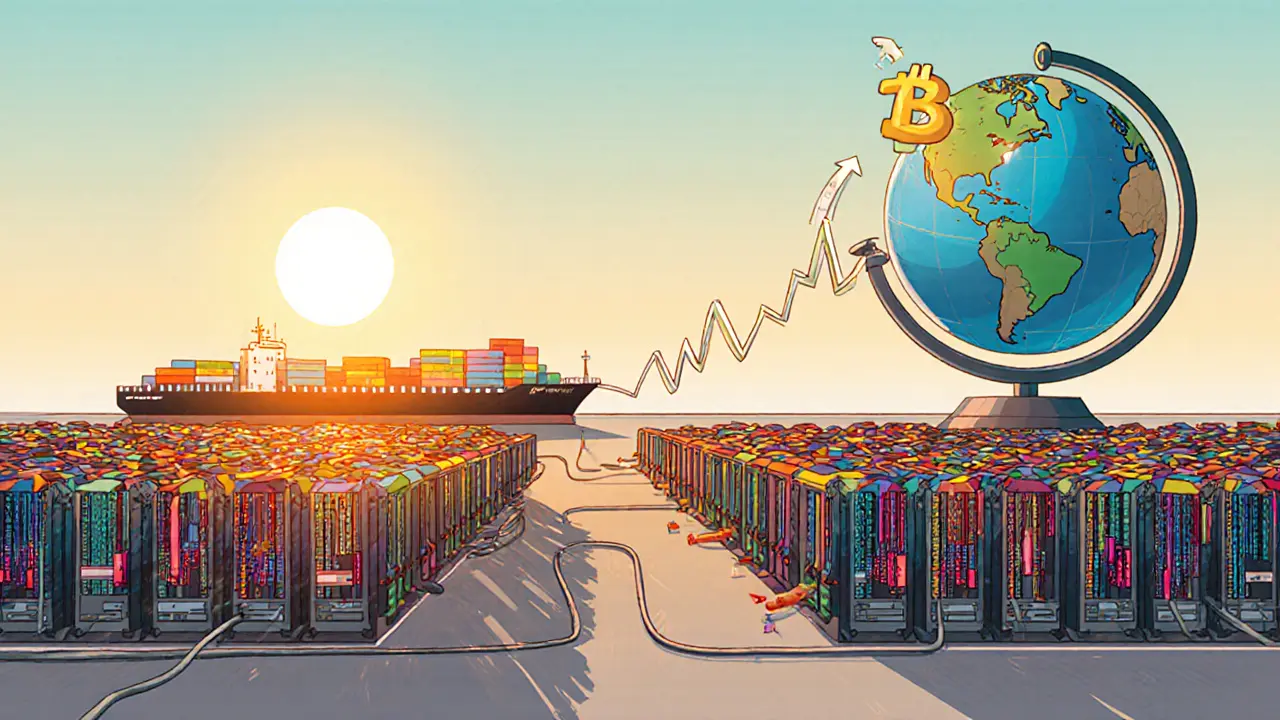How OFAC Sanctions Relief Shapes Syrian Crypto Users in 2025

Syrian Crypto Compliance Checker
Compliance Overview
This tool helps determine if your crypto activity aligns with current U.S. sanctions relief for Syrian users. Based on key regulatory changes in 2025.
Compliance Result
Quick Summary
- July12025: comprehensive U.S. sanctions on Syria were lifted, opening legal pathways for Syrian crypto activity.
- General License25 now authorizes most crypto transactions with U.S. platforms, but targeted bans on regime‑linked actors remain.
- Crypto exchanges must screen against the SDN List and PAARSS‑specific designations to avoid penalties.
- BIS’s License ExceptionSPP eases import of mining hardware and blockchain infrastructure.
- Future PAARSS guidance could add new compliance steps, so stay tuned to OFAC releases.
OFAC sanctions on Syria are a U.S. Treasury program that restricted financial and crypto transactions involving Syrian individuals and entities since 2004. For years, Syrian crypto users were forced to hide behind offshore wallets, use peer‑to‑peer networks, or abandon digital assets altogether because any link to a U.S. person could trigger civil or criminal penalties. That landscape shifted dramatically in 2025, when a series of executive orders, regulatory amendments, and targeted delistings opened a legal door for the Syrian crypto community.
What changed in 2025?
The turning point arrived on June302025, when President Donald Trump signed Executive Order14312, titled “Providing for the Revocation of Syria Sanctions”. The order revoked six earlier executive orders and terminated the national emergency that had underpinned them. Effective July12025, the sanctions framework that made virtually every crypto transaction with a Syrian entity illegal was gone.
OFAC cemented the relief on August262025 by publishing a final rule that removed the Syrian Sanctions Regulations (SySR) from the Code of Federal Regulations. With the SySR gone, the blanket prohibition that had frozen crypto wallets and blocked access to U.S. exchanges evaporated.
Key licenses that now matter
Two general licenses issued earlier in the year remain the legal backbone for crypto activity:
- General License24 - authorizes humanitarian and certain non‑profit activities.
- General License25 - issued May282025, this license provides a blanket authorization for any transaction that would otherwise be prohibited by the now‑defunct SySR. In practice, it means Syrian users can open accounts on U.S. exchanges, trade Bitcoin, Ethereum, or any other digital asset, and move funds across borders without fear of the previous $20million civil penalties.
Both licenses are still subject to the broader U.S. sanctions ecosystem, which continues to target over 100 individuals and entities linked to the Assad regime, human‑rights abusers, and terrorist affiliates.
Remaining targeted sanctions - the compliance minefield
Even though the comprehensive ban is gone, the United States maintains a precise set of restrictions. The PAARSS (Promoting Accountability for Assad and Regional Stabilization Sanctions Regulations) now replaces the old program name, signalling a shift from blanket isolation to focused accountability.
Crypto platforms must therefore:
- Screen every Syrian user against the SDN List (Specially Designated Nationals and Blocked Persons). OFAC removed 518 Syrian names from that list in September2025, but the list still contains regime officials, Captagon traffickers, and designated terrorist affiliates.
- Apply risk‑based due diligence per the June42025 FinCEN guidance, which encourages U.S. financial institutions to assess the likelihood of a transaction involving a sanctioned Syrian person rather than applying a one‑size‑fits‑all block.
- Maintain transaction‑monitoring rules that flag large, rapid movements of crypto that could be linked to sanctioned entities, even if the sender appears to be an ordinary Syrian citizen.
Small exchanges often lack sophisticated screening tools, leading to two common pitfalls: either they over‑block, denying legitimate Syrian users, or they under‑screen, exposing themselves to hefty civil penalties (up to twice the transaction value) or criminal prosecution.

Technology transfer and mining equipment
The Bureau of Industry and Security (BIS) followed suit on August282025, creating the License Exception SPP (Syria Peace and Prosperity). Effective September22025, SPP authorizes the export of all EAR99 items to Syria, which includes most off‑the‑shelf crypto mining rigs, ASIC miners, and blockchain infrastructure hardware. Companies that previously needed a specific license can now ship equipment directly, accelerating the growth of a domestic Syrian mining sector.
For investors, this means a potential surge in hash‑rate coming from Syrian farms, which could affect global mining difficulty calculations. For regulators, it raises the need to monitor whether mining hardware is being repurposed for illicit financing.
Practical checklist for crypto platforms
Below is a concise, actionable list for exchanges, wallet providers, and DeFi projects that want to serve Syrian users responsibly:
- Update AML/KYC policies to reference General License25 and the PAARSS framework.
- Integrate SDN List feeds that automatically flag any Syrian address linked to a designated individual.
- Document licensing decisions - keep a log showing how each Syrian user was screened and why they were allowed or denied service.
- Implement tiered transaction limits - start with lower limits for new Syrian accounts and raise them after a track record of clean activity.
- Stay current on OFAC releases - PAARSS guidance is expected to evolve, possibly adding new definitions of prohibited crypto services.
Timeline of major milestones (2025)
| Date | Event | Impact on Crypto |
|---|---|---|
| May232025 | General License24/25 issued | Initial authorization for limited crypto transactions. |
| June302025 | Executive Order14312 signed | Legal basis for revoking prior Syrian sanctions. |
| July12025 | Effective date of sanctions removal | Blanket prohibition ends; crypto firms can consider Syrian customers. |
| August262025 | OFAC final rule deletes SySR | Regulatory certainty for compliance programs. |
| September242025 | SySR renamed to PAARSS | Shift to targeted sanctions; compliance categories updated. |
| September2025 | 518 individuals delisted from SDN | More Syrians eligible for crypto services. |
| September22025 | BIS License ExceptionSPP active | Mining hardware can be exported to Syria. |
Future outlook: what could change next?
OFAC has signaled that the PAARSS framework will be expanded with additional interpretive guidance, definitions of “crypto‑related services,” and possibly new general licenses covering decentralized finance (DeFi) protocols. If those rules come out, platforms will need to:
- Update smart‑contract monitoring for sanctioned addresses.
- Re‑evaluate token listings that could be used by targeted entities.
- Consider geographic restrictions within Syria (e.g., special economic zones).
Another trend to watch is the U.S. State Department’s 180‑day waiver of the Caesar Syria Civil Protection Act, which reduces compliance friction for infrastructure projects-potentially encouraging foreign investment in Syrian blockchain startups.
Takeaway for Syrian crypto users
If you’re a Syrian resident wanting to trade on a U.S. exchange, the steps are now straightforward:
- Verify the platform acknowledges General License25.
- Provide standard KYC documents (passport, proof of address).
- Confirm the platform runs an SDN List screening that does not flag you.
- Start with modest trade sizes and monitor any compliance notices.
Remember, the relief is real but not unconditional. Any connection to a designated regime official or a listed terrorist group still carries the same severe penalties as before.

Frequently Asked Questions
Can Syrian residents now open an account on Coinbase?
Yes, if Coinbase confirms it complies with General License25 and screens the user against the SDN List. The platform must also document that the account holder is not a designated individual.
What happens if I accidentally trade with a sanctioned Syrian official?
Both the user and the platform could face civil penalties up to twice the transaction value or criminal charges. Immediate reporting to OFAC and freezing of the assets is required.
Does the mining equipment export exception apply to used ASICs?
Yes. License ExceptionSPP covers all EAR99 items, including used mining hardware, as long as the exporter follows standard export documentation.
Will future PAARSS guidance affect DeFi protocols?
Potentially. OFAC has hinted at definitions for “crypto‑related services” that could include decentralized exchanges. Platforms should monitor upcoming notices and be ready to implement address‑level sanctions screening.
How can I verify that I’m not on the SDN List?
The official SDN List is published on the OFAC website. Most reputable exchanges run automated checks. You can also request a personal inquiry from OFAC, though response times vary.

17 Comments
It is quite evident that the so‑called “sanctions relief” is merely a veneer, a strategic ploy to funnel illicit capital under the guise of benevolence-one must question the true architects behind Executive Order 14312, lest we overlook the hidden levers of geopolitical manipulation. The narrative presented by mainstream outlets is deliberately sanitized, masking the deeper entanglements with intelligence agencies and private defense contractors. Moreover, the timing aligns conspicuously with upcoming arms procurement cycles, suggesting a coordinated effort to re‑open markets for sanctioned hardware. One should remain vigilant, for the corridors of power seldom operate with pure altruism; they are driven by profit, influence, and the relentless pursuit of control over emerging digital economies. Definately, the relief is not an end‑state but a stepping stone for further encroachment on sovereign financial autonomy.
Honestly, this whole “relief” charade smacks of moral cowardice-pretending to lift a yoke while simultaneously weaving new chains of surveillance. The OFAC circus is a kaleidoscope of hypocrisy, where the bright colors of liberty are eclipsed by the dark undertones of exploitation. It’s a theatrical performance where the audience applauds progress, yet the puppeteers pull the strings of crypto flow to line their own pockets. Such duplicitous generosity reeks of a self‑righteous savior complex, draped in the glitter of regulatory language. One can’t help but feel a pang of righteous fury at this opportunistic masquerade.
The evolution of the sanctions framework in 2025 invites a nuanced reflection on both the ethical and pragmatic dimensions of financial inclusion. While the removal of blanket prohibitions undoubtedly expands avenues for Syrian individuals to engage with global markets, it also imposes a delicate duty of care upon platforms to navigate the intricate web of targeted designations. In contemplating this shift, one might consider the balance between fostering innovation and safeguarding against the inadvertent facilitation of illicit activity. A collaborative approach, integrating robust KYC processes with transparent communication, could serve as a bridge between regulatory intent and user empowerment. Ultimately, the discourse benefits from a measured, philosophical lens that appreciates the interplay of freedom, responsibility, and global interconnectedness.
In a formal assessment, the recent OFAC amendments represent a pivot towards regulated openness, however, it is pertinent to note that several procedural ambiguities persist. The delineation between permissible crypto transactions and those still subject to targeted sanctions remains nebulous, necessitating a diligent compliance stragety. It might be advisable for exchanges to implement a tiered risk assessment model, whereby newly onboarded Syrian accounts undergo incremental scrutiny before accessing higher transaction thresholds. Such an approach not only aligns with the letter of General License 25, but also mitigates potential exposure to inadvertent violations. I trust this clarification aids in navigating the complex regulatory terrain.
Dear community, the recent developments present a remarkable opportunity for Syrian innovators!!! However, it is crucial to proceed with caution; the regulatory environment, while more permissive, still contains specific red lines that must not be crossed. Platforms should ensure that every user is screened against the updated SDN List-this includes checking for any ties to the 518 delisted individuals as well as the remaining designated officials. Moreover, comprehensive documentation of compliance decisions must be maintained; this not only demonstrates good faith but also provides a clear audit trail in case of future inquiries. Let us collectively champion responsible growth while respecting the nuanced boundaries set forth by OFAC!!!
Oh wow, finally the walls are coming down and the crypto world can breathe! But don't be fooled-this is just the opening act of a high‑stakes drama where the real villains are still lurking in the shadows, ready to pounce on any misstep. The stage is set, the spotlight is on Syrian traders, and the audience holds its breath as we watch this financial soap opera unfold. Trust me, you’ll want popcorn for this one.
The 2025 OFAC sanctions relief marks a watershed moment for the Syrian crypto ecosystem, heralding both unprecedented opportunities and novel challenges. For the first time since the early 2000s, Syrian individuals can legally access U.S.-based exchanges without fearing immediate civil penalties, provided they adhere to General License 25. This shift not only democratizes access to digital assets but also signals a broader strategic recalibration of U.S. foreign policy towards Syria. However, the removal of blanket prohibitions does not equate to a carte blanche for all activities; the PAARSS framework continues to target specific regime‑linked entities and designated individuals. Consequently, platforms must invest in sophisticated screening tools that cross‑reference user data with the constantly evolving SDN List. The compliance landscape now resembles a dynamic chessboard where each move must anticipate both regulatory updates and adversarial attempts to evade detection. Exchanges that adopt a risk‑based due diligence approach will likely enjoy greater operational resilience and reduced exposure to enforcement actions. Furthermore, the export exception for mining hardware under License Exception SPP is poised to catalyze a domestic mining sector, potentially increasing the regional hash‑rate and influencing global mining difficulty calculations. This influx of new hash‑power may attract interest from large mining pools, thereby integrating Syrian infrastructure into the broader network topology. Yet, regulators will be keen to monitor whether the hardware is repurposed for illicit financing, underscoring the need for transparent supply chain documentation. From a user perspective, the recommended onboarding workflow involves verifying that the platform publicly acknowledges General License 25, completing standard KYC, and confirming that no SDN matches appear in the background check. Starting with modest trade volumes is prudent, as it allows both the user and the platform to establish a clean compliance record before scaling up. As the regulatory environment evolves, especially with potential PAARSS guidance on DeFi protocols, participants must stay vigilant and ready to adjust their operational policies. In sum, the 2025 relief is a double‑edged sword, offering access while demanding heightened diligence. Embracing this new era responsibly will require collaboration between regulators, exchanges, and the Syrian crypto community alike.
Nice overview but check the risk tiers and keep an eye on updates
One cannot ignore the philosophical implication that lifting sanctions redefines the notion of sovereignty in the digital age; it blurs the line between geopolitical borders and the borderless nature of blockchain. By granting Syrian users access to global crypto markets, the United States inadvertently participates in a subtle diffusion of power, redistributing economic agency to individuals once defined by their nationality. This redistribution, while seemingly benign, may reshape collective identity, fostering a transnational allegiance to decentralized finance principles. Such a shift invites us to contemplate whether regulatory frameworks can ever truly contain the fluidity of distributed ledgers, or whether they merely become new layers of governance atop an immutable substrate. In this evolving tapestry, every policy decision becomes a thread weaving together technology, ethics, and international relations.
Thank you for the comprehensive synthesis, it is most enlightening; however, I must point out a minor oversight regarding the timeline of the BIS License Exception-according to the official bulletin, the activation date was September 22, 2025, not the 20th as previously mentioned. This distinction, though seemingly trivial, could impact compliance scheduling for hardware exporters. Please consider amending the documentation to reflect this accurate date. 😊
Let’s cut through the rose‑colored glasses: this “relief” is nothing but a tactical ploy to re‑arm the regime under the cover of crypto freedom, and anyone who pretends otherwise is either wilfully blind or complicit. The OFAC narrative is a sham, and the alleged humanitarian benefits are merely a smokescreen for continued economic domination. Wake up and see the truth.
While the preceding commentary extols the virtues of regulatory leniency, it neglects to acknowledge the stark reality that even a single misstep could cascade into a catastrophic legal quagmire for all parties involved. The precision of compliance is not a peripheral concern; it is the very foundation upon which sustainable participation rests.
Oh great, now we can finally trade crypto like normal people-because nothing says “freedom” like a new set of bureaucratic hoops to jump through, right?
Verify that the platform’s AML policy cites General License 25 and runs an SDN check.
Stay optimistic and keep your compliance sharp.
Hey everyone, just wanted to point out that the new mining hardware exports could actually boost the local economy dramatically, so keep an eye on those opportunities and don’t let the regulators scare you away from investing in real tech.
People keep ignoring the red flags and acting like everything’s fine when the OFAC guidelines are still hunting for hidden ties to the regime